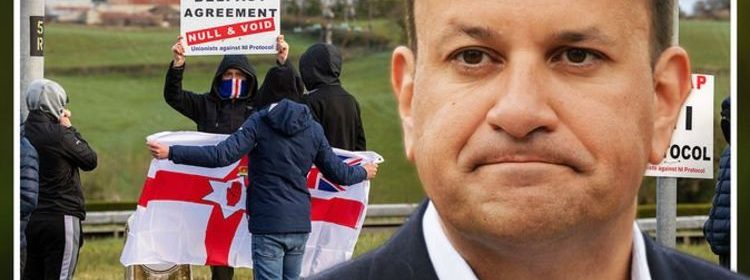Oh dear, Leo! Varadkar faces looming Irish crisis unless EU bends on hated Brexit rules

Brexit deal 'was always a dreadful deal' says Farage
We use your sign-up to provide content in ways you’ve consented to and to improve our understanding of you. This may include adverts from us and 3rd parties based on our understanding. You can unsubscribe at any time. More info
DUP leader Sir Jeffrey Donaldson will hold talks with Ireland’s deputy premier today to discuss the Brexit deal’s hated Northern Ireland Protocol. Ahead of the meeting, the unionist chief accused Mr Varadkar of having “spent years scaremongering about checkpoints that would never exist” and said he had “championed” the post-Brexit trade rules that have “fundamentally undermined” the Good Friday Agreement. The Protocol to avoid a hard border has been hugely controversial since it entered into force at the beginning of years.
Downing Street has warned that its measures have had a chilling effect on trade between Great Britain and Northern Ireland.
Unionists have said the rules, which have essentially introduced a trade barrier in the Irish Sea, have driven a wedge between the region and the rest of the UK.
In order to keep the Irish border open, Northern Ireland essentially has remained within the single market, with a number of checks on goods shipped from mainland Britain.
Mr Varadkar helped broker the original terms as part of the UK’s EU withdrawal agreement in October 2019 while he was still Irish premier.


He since has stepped aside as part of a coalition agreement in Dublin and will return to the top job next year.
Mr Donaldson suggested he could inherit a messy situation on the Irish border if Dublin and Brussels don’t agree to rework the Brexit trade rules, as requested by the UK Government.
“He can continue with the rhetoric of recent years and watch those events unfold or he can adopt a new spirit of positive cooperation,” the DUP leader said.
“Arrangements which respect both the EU single market and Northern Ireland’s place within the UK internal market are not just achievable but would deliver on the promise of protecting the Belfast Agreement.”

Both the UK and EU have published plans for simplifying the terms of the Protocol.
Talks are expected to be held this month to address the concerns ahead of the expiration of a number of grace periods from EU red tape.
Northern Ireland’s economy minister Gordon Lyons this week called for further delays to the Irish Sea checks.
He said there would be “real problems” if the grace periods expire as planned on October 1.
MUST READ: Brexit chaos as British students blocked from studying in EU

The UK’s so-called “Command Paper” called for the entire Protocol to be renegotiated to remove the majority of checks between GB-NI, as well as erase the European Court of Justice’s powers over the measures.
But Brussels has rejected any renegotiation and insisted fixes can be found within the existing treaty text.
The grace periods due to expire include the controversial ban on British-made chilled meats from being sold in Northern Ireland.
If a fix isn’t found this could mean the sale of British sausages and burgers in the region is prohibited.
Another concern is the need for supermarkets to start using export health certificates for all products of animal origin shipped from GB to NI.
DON’T MISS
Brussels’ EU army hopes slashed by defence experts as bloc ‘too slow’ [INSIGHT]
Bitter EU to block UK from key treaty in ‘tit for tat’ Brexit response [REVEALED]
Matt Hancock sweeps ex-aide lover off to Swiss Alps for getaway [EXCLUSIVE]
Brexit and 'failed markets' to blame for shortages says host
Mr Lyons warned this would significantly increase the administrative burden and risk food shortages.
“There will be real problems for our supplies particularly in terms of food,” he said.
Aodhan Connolly, of the Northern Ireland Retail Consortium, said businesses were not prepared for the end of the grace periods.
He said: “It was put in place to allow a new system to come in that would remove friction from moving goods from Great Britain to Northern Ireland.
“That isn’t in place and so we need a standstill.
“Otherwise there will be new certification required that will need signed off by a vet.
“That means friction, which means costs that neither retailers nor Northern Ireland householders can afford.”
Source: Read Full Article
